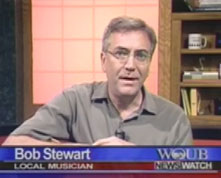|
See recent articles about Bob Stewart's music.
REVIEW: 'Professor/picker's new album has a million merits'. Jim Phillips, Senior Writer, (The Athens News, October 5, 2006).
... [Bob] Stewart ... doesn't make music to bang your head to; his songs are subdued, subtle ruminations set to gentle, sparkling folk music.
He's a fine acoustic guitar player, and his band's arrangements, also featuring lead guitar, bass, harmonica, and occasional sprinklings of harmony vocals and mandolin, are never too busy.
His voice won't blow you out of your Birkenstocks, but it's a good voice, warm and honest and well broken-in, kind of Tom Paxton-y. His lyrics are well crafted without being overtly arty, and tend to cluster around poignant topics of love and loss.
Working this territory, you run the ongoing risk of slipping from poignancy into mush, but Stewart mostly keeps his feet out of the goo. One song that could easily have been unbearable, but ends up quite touching, is "Old Lovers' Lament," a mournful evocation of the old age that humbles and crumbles us all in the end.
The merits of this quietly satisfying album have been partly overshadowed by its title tune, which Stewart wrote to commemorate 14 Marines from Ohio who were killed in Iraq. He released the song on the Internet in February, to mark the six-month anniversary of Ohio's "Day of Mourning" for the soldiers, and thousands of people from around the world have visited the site to listen to or download the tune.
The song was recently cited by the Rhapsody online music service as one of the most significant new releases of the week in the "Americana" musical genre.
It's a simple and affecting number, avoiding any overt political message about war to focus on the personal impact of loss. "Today we stopped to say goodbye to our children who fought and died/ Far too young and too alone a million miles away from home," Stewart sings, over a soft, marching drumbeat, gospel call-and-response backup vocals, and a swelling chorus that includes Stewart's own children. It works.
While the title tune may be getting most of the attention, the rest of the album is well worth a listen too.
REVIEW: 'A Million Miles Away from Home' -- Prof pulls together another catchy yet gentle collection of songs. Randy Surface, Entertainment editor (Athens Messenger, Aug. 17, 2006).
Chalk up another fan of Bob Stewart's music.
Stewart's voice, like his music, is sometimes a little too smooth and soothing.
That's not meant to undercut the fact that his new CD "A Million Miles Away from Home" is also very good.
The album is folkishly laid-back and says something important at the same time.
The disc gets off to a bright and hopeful start with "Your Love."
The song, along with most of the album, manages to not sound contrived, a tall order for most folk music these days.
The record is no slice of bittersweet Americana.
Stewart is an old guard singer/songwriter.
He recalls the best days of James Taylor and John Prine without aping either songwriter's style.
"One Emotion" could be a cross-over radio hit if it weren't so darn good.
It's a slow dance-worthy number that features local studio whiz Chris Weibel on organ.
The fast-moving jazz shuffle of "Bit Phat Baby" is exciting, even though it's named for Stewart's overweight cat.
"The Goodbye Song" is a surprisingly relevant and engaging song about change, especially since Stewart penned the song 30 years ago.
Stewart has much to say and the listener longs to hear him better.
Some tracks are just a bit too busy with harmonica, drums, multiple guitars, and the like. Stewart's singing sometimes just gets lost.
"Can We Ever Be the Same" is an otehrwise great song that is obscured by too much harmonica.
Overall though, Stewart's backing band is tastefully subdued.
The mandolin is fantastic, especially on "I Never Knew Lonely."
Stewart's unique solo guitar take on the Christian Doxology is featured on "The Doxology."
The title track's interesting take on a patriotic hymn is pleasantly not heavy-handed.
The inspiring track was written as a way to cope with the cost of war.
Stewart wrote the song remembering the death of 14 Ohio marines in Iraq -- the same deaths that inspired Ohio's Day of Mourning.
Stewart's low rumble is beautifully augmented by a choir of soulful background vocals.
With "A Million Miles" Stewart has managed to write 12 beautiful songs [*] -- 12 more than most musicians will ever write.
It's thoughtful music that isn't pretentious and feel-good music that isn't shallow.
As Stewart says in "Your Love," the CD actually "made me realize it's good be be alive."
* Elliot Abrams wrote "The Storm"
|

| Thank yous go out to my band members (Elliot Abrams, Greg Bikowski and John Ortman) and the other outstanding musicians (Tasha Attaway, Christine Beam, John Borchard, W. Otis Crockron Jr., Jannelle Cummings, Terry Douds, Zeke Hutchison, Keely Flaherty, Daniel Lopez, Nick Nesbitt, Alli Purcell, Ben Stewart, Bodie Stewart, Molly Stewart, Mike Radcliffe, Debra Rentz, Scott Schell, David Tadlock and Chris Weibel), who shared their talents on this CD;
Friederich Pohl, for making it possible for Bodie to record his vocal track from a million miles away;
Molly Stewart, for her photograph of Devil's Golf Course in Death Valley (taken in March 2006);
Sarah Nix and Stella Lee, for the late-night, last-minute scan of Molly's photograph;
W. Otis Crockron Jr., for his backup vocals arrangement of on "A Million Miles Away from Home";
Claudia Strong, for her incredible design work and commitment to making the CD and jacket visually powerful;
Chris Weibel, for the passion he showed day after day on this project;
Rosemary Palmer and Paul Schroeder, for not being afraid to express both their grief and gratitude to a total stranger; and Penny Shelton, for her unwavering support. your love (c)2006 Stacy Puzo & Bob Stewart Stacy Puzo wrote the first draft of "Your Love" in 2003, claiming (and I believe her) that it was inspired by my relationship with my new bride, Penny Shelton. I revised the lyrics to fit one of my recently composed instrumental tunes, a process similar to my combining Puzo lyrics and another of my tunes that became the song "Walkin'" (on the 2004 release, "Don't Think You Know"). When soprano Debra Rentz heard an early recording of the song she said she thought it was a "fun song," so I asked her to come up with a harmony part before our recording session. She did, and we liked it. Very much. We also decided to give mando a try. I liked Zeke Hutchison's effort so much that I bumped the song up to track one on the CD. the storm (c)2006 Elliot Abrams Elliot Abrams was playing guitar with me even prior to the formation of the Bob Stewart Band. He's been writing songs for decades, but only records them for posterity. I asked him if he'd let me include "The Storm" on this CD and he graciously agreed. It's a powerful, thoroughly poetic statement about the impact of Katrina on the people of New Orleans and the entire region. John Borchard added a "swampy" (his word, not mine) dobro arrangement to give the song a bit of a delta feel, and Elliot laid down a terrific acoustic guitar track. All I did was sit back and sing. one emotion (c)2006 Stacy Puzo & Bob Stewart This song was written and composed in 2002. I planned to include it on "Don't Think You Know" (2004) but that CD ended up filling up fast. So Chris saved the Bryan Gibson drum track that we recorded and used it as the starting point for this version. A noteworthy aspect of "One Emotion" is that it was one of two songs that Stacy Puzo handed to me at the same moment back in 2002 (the other was "That's Not What Dancin's For," on the 2004 release). Within ten minutes I had melodies and harmonies for both songs, and thus began a collaboration that resulted in several songs by Stacy and me on the two releases to date. As this particular recording progressed, I could hear in my head a descant part and asked soprano Debra Rentz to give it a try. We also added her harmony vocals on the choruses. Adding double-pedal electric bass intro and out (Terry Doud) and organ (Chris Weibel) produced a "thick" and I think richly textured arrangement. We had planned a simple fade at the end, but decided to let it run as an extended-play instrumental to encourage slow dancing. big phat baby (c)2006 Bob Stewart This instrumental is named for one of our four cats, a pitch-black feline once named simply "Baby." She grew into the name "Big Phat Baby" after a period of over-eating (which I've come to call the "Chicago diet" as it transpired during a period that involved my many extended visits to Chicago). At the time of this recording, the cat remains "Big Phat Baby," in size and attitude (read wikipedia's definition of "phat"). i never knew lonely (c)2006 Stacy Puzo & Bob Stewart Another Puzo/Stewart song, there's really only one thing I can say about this recording: Zeke Hutchison is a mando genius. the goodbye song (c)2006 Bob Stewart This song probably won't make sense to listeners unless they know I wrote it my senior year in high school as I was preparing to graduate from International School Bangkok (Thailand) and head back to the United States for college. I had lived in Thailand from 1958 to 1975, the year I graduated, growing up in the home of my missionary family. The prospect of graduating from high school and going off to college is daunting enough for most people, but having to leave my home in Thailand and travel 12,000 miles (approximately 19,300 kilometers for metric-minded listeners) away from my family inspired this song. i got this feelin' (c)2006 Bob Stewart This song is too complicated to explain, but suffice it to say that it isn't about Penny. If you listen to Terry Douds' bass arrangement, you'll notice a couple of distinctly '70s disco riffs. old lovers' lament (c)2006 Bob Stewart I wrote "Old Lovers' Lament" as a college student in New York City in the late 1970s. I was inspired by the old folks who stared out the windows of their Lower East Side walk-ups day in and day out, seemingly with nothing to do but watch people like me walk up and down 7th Street or St. Marks Place on my way to work or to class. I listened to a lot of John Prine back then, and any fan of Prine's will recognize the themes from his classic song about growing old, "Hello in There." His accute sense of social and personal tragedy shaped this song more than any other one I've ever written. My band doesn't like to play it too often because of how sad it is, but I think this recording captures more than just the self-evident sadness. John Borchard's dobro and Debra Rentz' vocal harmony renders it a very, very pretty song that ends with a sense of hope replacing the building sense of loneliness. dragon fly (c)2006 Bob Stewart I named this instrumental for the dragon flies that buzzed from flower to flower in my front yard in Chacheungsao, Thailand. They seemed to be on a mission, again and again alighting on grass blades and flower petals. I composed the tune in 2003 on my Alvarez archtop electric, which is permanently tuned to an open E (see also "Your Love" on this CD, and "Walkin'" on my 2004 CD). We had planned to add electric or acoustic bass, but discovered that the recording of the electric guitar already produced a natural bass line. With the added brushes on drum (Mike Radcliffe) and John Ortman's harmonica, the tune seemed complete, so we resisted any temptation to mess with it "as is." can we ever be the same? (c)2006 Bob Stewart I still remember bolting upright in bed one spring or summer night in 2002, this song swirling around in my head. Thankfully, I decided to write it down instead of trusting my memory until morning. When I played it at an open-mic night a week or so later I invited a new acquaintence, Scott Schell, to play harmonica. When I asked if he wanted to practice it before hand he indicated that he'd just pick it up after a verse or two during the live performance. Given the Blue Gator open-mics often bordered on jam sessions, this seemed to make sense at the time. Having just started playing out in public again after a long hiatus from serious music-making, I often recorded sessions on my laptop so I later could get a feel for how I sounded. That night's performance and recording of "Can We Ever Be the Same?" made me realize that other musicians had a lot to offer on my songs. I will forever be in Scott's debt for teaching me that lesson that night. Bob Stewart Band mate John Ortman's harmonica playing skills are plenty evident on this CD, and his graciousness in allowing me to use Scott (for old time's sake) on this recording is appreciated. the doxology I grew up in the household of Southern Baptist missionaries, and to this day sing in my Presbyterian church choir. Church music such as the Doxology is in my musical DNA. My pianist mother plays just about every hymn in the Baptist hymnbook by ear, in any key, and with her lovely Baptist flair. She recently lamented in passing my unmet potential as a pianist, if only I'd stuck with lessons. James Taylor's appearance on my musical radar in about 1970 wiped out any interest I had in playing piano, however. Fans of his early recordings will remember some of the beautiful guitar instrumentals that served as segues or lead-ins, such as "Greensleeves" (which isn't even listed on the album's song list) leading into "Something's Wrong" on his 1968 CD on the Apple label. To play guitar in such a way seemed unachievable to me as a 14-year-old strummer. But that aspiration, combined with my church-based music heritage, ultimately produced this arrangement of the Doxology, and illustrates the direction my guitar playing is taking of late. In fact, my next CD project will be instrumental recordings of some favorite hymns. I decided to include my arrangement of the Doxology on this CD partly to foreshadow the next project. I originally planned to end this CD with the Doxology, but decided it was needed more as prelude to the CD's title track, "A Million Miles Away from Home," than benediction to the CD. a million miles away from home (c)2006 Bob Stewart I put the title track last on this CD because I couldn't think of any song that could or should follow it. It needs to linger in the mind a bit and be meditated on. I wrote "A Million Miles Away from Home" on August 8, 2005, Ohio's official "Day of Mourning" following the deaths of these 14 Marines from Ohio: 1. Jeffrey Boskovitch, Seven Hills 2. Daniel Deyarmin Jr., Tallmadge 3. Brian Montgomery, Willoughby 4. Nathaniel Rock, Toronto [Killed by enemy fire in an ambush near Haditha, Iraq (August 1, 2005); Roger Castleberry Jr. (Austin, Texas) and David Coullard (Glastonbury, Conn) were killed in the same ambush. James R. Graham III (Coweta, Okla.) also was killed in Iraq on August 1, 2005.]5. Timothy Bell, West Chesterfield 6. Eric Bernholtz, Grove City 7. Michael Cifuentes, Fairfield 8. Christopher Dyer, Cincinnati 9. Bradley Harper, Dresden 10. Justin Hoffman, Delaware 11. Kenneth Kreuter, Cincinnati 12. Aaron Reed, Chillicothe 13. Edward "Augie" Schroeder, Columbus 14. William Wightman, Sabina [Killed by a roadside bomb south of Haditha, Iraq (August 3, 2005); Nicholas Bloem (Belgrade, Mont), David Stewart (Bogalusa, La), Grant Fraser (Anchorage, Alaska), and Kevin Waruinge (Tampa, Fla.) were killed in the same roadside bombing. Adam Strain (Smartsville, Calif), Charles Warren (Duluth, Ga.), Mathew Gibbs (Ambrose, Ga), and Jerry Ganey Jr. (Folkston, Ga) were killed in other locations in Iraq on August 3, 2006 (for a complete list of U.S. casualties, see icasualties.org/oif).]Factored out over the population of the United States, it would be the equivalent of more than 350 Americans dying in two battles fought over just a three-day period. I sat on my front porch those August mornings, reading newspaper accounts about Ohio parents' who suffered such great loss. I read about moms and dads waiting for phone calls about their sons. I realized it was time to write a song about the war. I sat on the porch swing with my guitar and started composing "A Million Miles Away from Home." When my wife came home for lunch I played it for her. We both cried. I played it for my neighbor, guitarist Matt Ziff. He recommended I use a more dissonant chord between verses. I get many compliments for that chord, and I attribute it to Matt's suggesting it (his son Ben helped me figure out the name of the chord: it'd take the form of a C7sus4+11/Bflat played with the capo on the third fret). Everytime I played it for someone new I found myself on the verge of tears. The verse about a mother waiting by the phone, praying that her son was alive, is particularly triggering. When Chris Weibel heard it the first time he said that I needed to get the song "out there." Others who heard it said the same. So, with Chris' help, I was able to assemble musicians on short order and record the song in time to release it as a single (on the Internet) on the six-month anniversary of Ohio's "Day of Mourning." I sent email notices about the song to everyone I knew, encouraging them to pass the song along to anyone needing comfort following the heavy losses of early August, 2005. Bloggers (e.g., James McCauley and Marshall Thompson mentioned the song and Web address, a Marine Mom's support group (mmo.proboards10.com) discussed it in a couple of their bulletin board "threads," a bulletin board aimed at Marines ("Sgt Grit's Marine Forum", at grunt.com) gave it a mention, as did a bulletin board in South Orange, New Jersey. I also have received a number of comments from listeners, who by the release date of the CD number more than 1500, including listeners from nearly 40 countries. I continue to encourage people to download the free version of the song, and have included that Web address on the back cover of the CD. I should note here that while the version of the recording on the Internet is slightly different than what is on the CD, I plan to leave the original version online as the free download for the sake of continuity. The changes were relatively small, but important enough to make: I re-recorded my vocal track to better match the background vocalists' timing on certain phrases, and we added several more voices to the "choir" toward the end of the song to communicate a sense of a growing community. The voices we added were those of several talented young vocalists in Athens, Ohio, including my own children. It's my hope that their voices will help bring greater awareness among young people about the personal loss associated with the war in Iraq. Through this song I have become acquainted with Rosemary Palmer and Paul Schroeder, who lost their son "Augie" on August 3, 2005. Through their loss I have learned a great deal about the war's tragic consequences. |

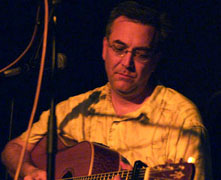 Bob Stewart, playing one hot summer night in Leipzig, Germany (July, 2005). 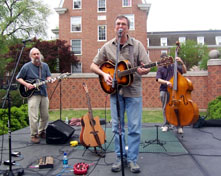 Elements of the Bob Stewart Band playing in April, 2006.  Chris Weibel (producer). This picture was taken in December, 2005 during our session at 3Elliot when we recorded Mike Radcliffe's drum tracks.  Mike Radcliffe, tuning his drums during the December 2005 session. Mike now resides and works as a drummer in Nashville, Tennessee, but because of family ties to the Athens area we were able to intice him to town for this project.  Elliot Abrams ("The Storm"), playing one of his many fine, fine instruments at a gig in April, 2006.  Greg Bikowski, during the recording session for "Can We Ever Be the Same?" and "Big Phat Baby." 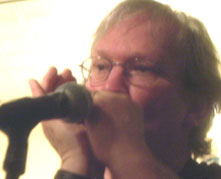 John Ortman, playing at a Donkey Coffee gig.  John Borchard, puttin' "swampy" into "The Storm" during an early June, 2006 recording session. 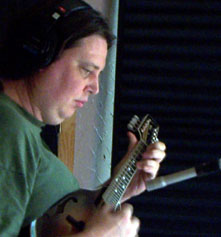 Zeke Hutchison, working out his genius for the microphone.  Scott Schell, concentrating on his harmonica licks on "Can We Ever Be the Same?" 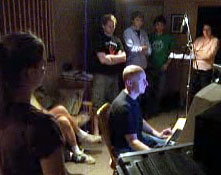 Vocalists listening to playback during the "choir" session, when we added the additional singers to "A Million Miles Away from Home." 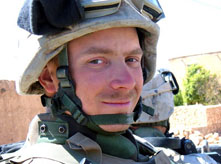 Marine Lance Cpl. Edward A. Schroeder II, killed Aug. 3, 2005 in Haditha, Iraq. 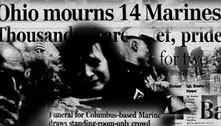 Art work created by Julia Marino, to accompany an article she wrote for Ohio University's Outlook publication about the CD project. |
